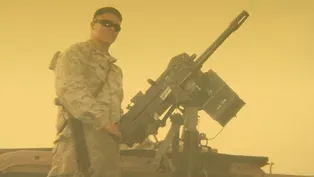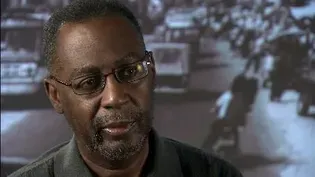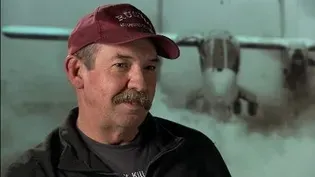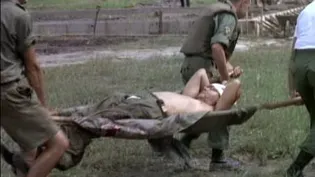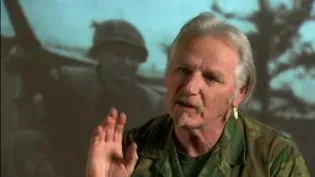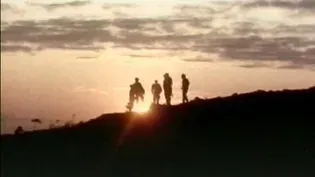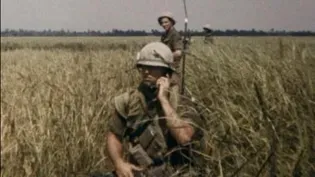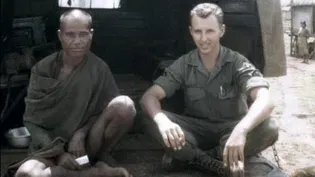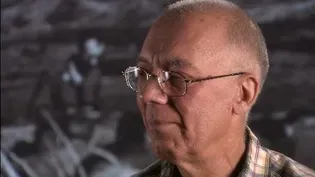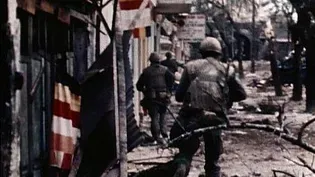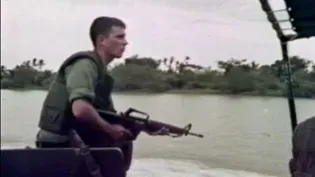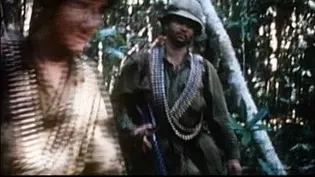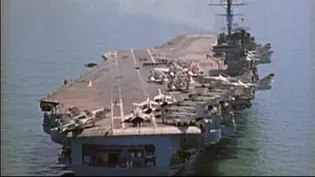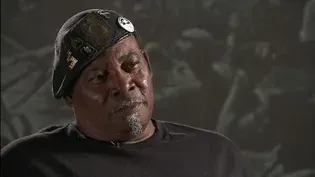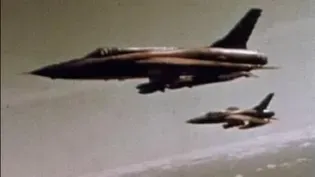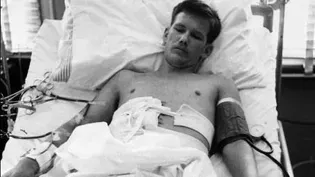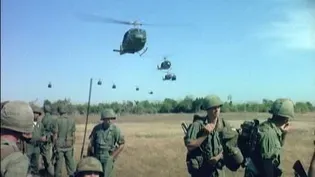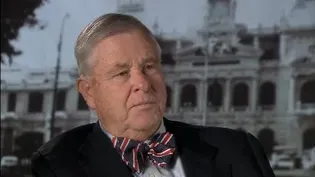
Vietnam: Escalation - Elusive Enemy
Clip | 8m 2sVideo has Closed Captions
Encounters with underground tunnels and their growing uncertainty in the mission.
1966 As the war raged on, service people arrived via commercial aircraft and were dispersed to dangerous locations that needed exploration. Veterans describe their dangerous experiences in enemy-built underground tunnels and their growing uncertainty in the mission. (Part 5/7)
Problems with Closed Captions? Closed Captioning Feedback
Problems with Closed Captions? Closed Captioning Feedback
Wisconsin War Stories is a local public television program presented by PBS Wisconsin
Thanks to lead gifts from Don and Roxanne Weber, Associated Bank, Ho Chunk Nation and the Lynde and Harry Bradley Foundation.

Vietnam: Escalation - Elusive Enemy
Clip | 8m 2sVideo has Closed Captions
1966 As the war raged on, service people arrived via commercial aircraft and were dispersed to dangerous locations that needed exploration. Veterans describe their dangerous experiences in enemy-built underground tunnels and their growing uncertainty in the mission. (Part 5/7)
Problems with Closed Captions? Closed Captioning Feedback
How to Watch Wisconsin War Stories
Wisconsin War Stories is available to stream on pbs.org and the free PBS App, available on iPhone, Apple TV, Android TV, Android smartphones, Amazon Fire TV, Amazon Fire Tablet, Roku, Samsung Smart TV, and Vizio.
[slow jazz music] - Will Williams: Coming outta Mississippi, I was prepared, anyway, for survival.
When I started getting higher in school and learning about the Constitution, the Declaration of Independence, I couldn't square it.
I couldn't understand how this could be true.
We're created equal, and I'm seeing people being lynched.
But it was easy for me to fight.
And on January 3, we boarded ship and left for Vietnam.
- Jim Kurtz: But the people who went as replacements went by air.
We flew directly to Vietnam into Tan Son Nhut, which is the main airport in Saigon.
And the plane lands and they open the door up.
And it was just like walking into a blast furnace.
This was at 3:00 in the morning.
It was probably about 90 or so, and then the tremendous noise of aircraft taking off on missions, helicopters going all over the place, and the smell.
It'd just knock your socks off.
Well, I go down the steps, and there's a sergeant down there with a clipboard.
And he said, "All the lieutentants but Lieutenant Kurtz, follow me."
And I said to him, "What did I do wrong?"
[laughs] - Dan Hinkle: I landed at Tan Son Nhut, got off the airplane, went to the 90th replacement depot.
Within a half an hour, I was assigned the 4th infantry division.
The next day, I was on a chopper and we flew out to the base camp.
I was assigned to a company and given a platoon.
I was in country 48 hours, and I was an infantry platoon leader.
With a combat mission.
Thirty days after I arrived, I was crawling through tunnels in Cu Chi with a flashlight and a .45.
And I didn't care.
- Will: In Cu Chi, we built our base camp right above the tunnels.
I don't know why the military didn't know they were there.
They had intelligence people and those tunnels were old.
People within the perimeter was getting wounded or killed, and the perimeter hadn't been breached.
No one had gotten in.
We couldn't understand it.
We took a lot of casualties from people in the tunnels.
- The tunnels were already in place way before we got there.
They were used against the French.
There was entire little communities down underground.
Ammunition storage, food storage, hospitals, and hundreds of firing perches.
- We had what we called tunnel rats.
They used the smallest people in the outfit were the ones that would go into the tunnels and search.
Johnny H. Johnson was our tunnel rat, and he had gotten shot.
I went in and brought him out.
Then my curiosity made me go back in to see what's beyond where he was hit.
When you first go in, you would go around the corner or down and up again.
And it protected them from explosives and from bombs.
They had kitchens there where they cooked.
It was basically where they lived and fought, right beneath us.
That was their staging area.
- Later, I was up at a place called Loc Ninh, which was an old rubber plantation.
And it turned out that we were up there to provide security for the French so that they could make some money.
- It was the heart of the rubber plantations.
We saw the Firestone, Michelin, Goodyear plantations.
The rubber trees, y'know, that we were fighting for, I think, later, that's part of why I was there.
I was protecting the corporate interests.
- And I was in a mechanized battalion.
So we had tanks and armored personnel carriers.
The thunder of us moving, you could hear it for miles.
And there were things that fell by the wayside, like trees.
We had a representative, a Frenchman, attached to the battalion that would follow along behind us and count the number of rubber trees so that the United States could reimburse these people for the trees we destroyed.
- The rubber plantations that were still operating, they were paying off the VC to not bother them, and then when we'd come in there, if we got into a firefight, we would have to pay for any tree that we shot.
After I got promoted to captain and they didn't really know what to do with me, one of my jobs would be to go out with the plantation manager, and we would count trees with bullets in 'em.
I had taken some French in college; I knew a little French, but not much.
And I never made an effort to communicate with him.
If they wanted Uncle Sam's money, they could talk in Uncle Sam's language, as far as I was concerned.
- At times, we did get hit pretty hard.
I know right outside of base camp at Hobo Woods.
I couldn't understand why we kept going in there.
We would go this week, lose a lot of people.
A week or two later, we'd go back, and the same thing'd happen.
- We would take the same ground over and over and over.
And I didn't know until 20 years later that it was a war of attrition.
Isn't that a term?
War of attrition.
It's acceptable to us if we only lose one guy to your six.
Our victory amounts to a body count.
- I was in a G-1 section, and one of my jobs was to deal with body count.
And this general walks in, and he says, "Captain, I don't like these numbers."
And I said, "Sir, I agree with you.
"We had a bad day that day.
The 1st division had a bad day, took some bad casualties."
He says, "I don't think you understand.
I don't like these numbers."
And what he was suggesting was that the body count wasn't high enough.
And I said, "Sir, here's a grease pencil and a rag.
You do what you wanna do."
And then he blew up.
And he said, "Captain, you're insubordinate.
Your career is over."
And I said, "I'm not gonna do anything like that because it's wrong."
And he stormed outta there.
He was really, really, very unhappy with me.
- I don't know.
I don't know how you could make one understand it, what it means to lose someone.
If it's not you getting hit, but someone you've known.
To see them die.
- I got wounded right about Christmas and New Year's.
I was reassigned because I wasn't able to continue as a platoon leader.
I went from tunnels in the jungle to having a hot meal in the officer's club at Tan Son Nhat Airbase.
Two or three days later, my platoon was caught in an ambush.
I shoulda been there.
Video has Closed Captions
OIF Army veteran Crystal hits the road to find her way home to an organic farm. (5m 20s)
Video has Closed Captions
Vietnam War veterans help today's veterans cope with the invisible scars of combat. (30s)
Vietnam: Draw Down - Rear Echelon
Video has Closed Captions
Veterans assigned to support jobs in the military describe life on and off duty. (7m 40s)
Vietnam: Draw Down - Hamburger Hill
Video has Closed Captions
Veterans recall the haunting memories of a battle they waged for many days. (6m 49s)
Vietnam: Draw Down - Firepower
Video has Closed Captions
Air Force veterans recount dangerous missions targeting the North Vietnamese Army. (8m 1s)
Vietnam: Draw Down - Broken Bodies
Video has Closed Captions
Wounded veterans and hospital staff describe field hospital scenes and returning home. (7m 17s)
Vietnam: Turning Point - Walking Point
Video has Closed Captions
Veterans describe the dangers and responsibilities of walking point. (6m 56s)
Vietnam: Turning Point - The Price
Video has Closed Captions
Veterans reflect on the staggering casualties in Vietnam, and how they coped. (8m 19s)
Vietnam: Turning Point - TET 1968
Video has Closed Captions
The Tet Offensive shocked both soldiers and the American public. (8m 13s)
Vietnam: Turning Point - Montagnards
Video has Closed Captions
Veterans discuss working with the Montagnards, people indigenous to Vietnam. (6m 57s)
Vietnam: Turning Point - Khe Sanh
One of the bloodiest battles of the Vietnam War took place at Khe Sanh. (7m 36s)
Vietnam: Turning Point - Hue City
Video has Closed Captions
The battle at Hue City highlighted the dire state of the Vietnam War. (6m 47s)
Vietnam: Turning Point - Brown Water Navy
Video has Closed Captions
River-based Army and Navy veterans describe facing enemy attacks and Agent Orange. (8m 12s)
Vietnam: Escalation - Send in the Marines
Video has Closed Captions
Marines describe their arrival in Vietnam and the difficulty of jungle warfare. (8m 7s)
Vietnam: Escalation - Naval Presence
Video has Closed Captions
Navy veterans explain their experiences off shore supporting Special Forces. (7m 16s)
Vietnam: Escalation - Elusive Enemy
Video has Closed Captions
Encounters with underground tunnels and their growing uncertainty in the mission. (8m 2s)
Vietnam: Escalation - Dropping Bombs
The allure, challenges and heartbreaking loss of early air combat in Vietnam. (6m 44s)
Vietnam: Escalation - All Hell Broke Loose
As missions became more dangerous, casualties rose. (8m 48s)
Vietnam: Escalation - Airmobile
Veterans of the helicopter brigades describe experiences of bravery, danger and loss. (7m 54s)
Vietnam: Escalation - Advise and Assist
Explore the early events that set the conflict and United States participation in Vietnam. (6m 6s)
Providing Support for PBS.org
Learn Moreabout PBS online sponsorshipSupport for PBS provided by:
Wisconsin War Stories is a local public television program presented by PBS Wisconsin
Thanks to lead gifts from Don and Roxanne Weber, Associated Bank, Ho Chunk Nation and the Lynde and Harry Bradley Foundation.

